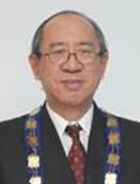
Professor Po-Quang Chen was born on 23 December 1942 in Nagoya, Japan, where his father practiced there in a city hospital. He soon came back to Taiwan due to poor conditions during the Second World War. He was educated in the primary and middle schools in Taiwan. He entered the Medical College, National Taiwan University (NTU) for his tertiary education and was awarded an MD degree in 1968.
After his graduation, he was drafted as a medical officer in the army for one year. Following that, he commenced a 4-year residency program, one year at Taipei Veteran Hospital, and the subsequent three years at the National Taiwan University Hospital. He completed the program in 1973. He was then invited to join the Taiwan Miner’s General Hospital, where he was involved in both administrative work and patient care until the summer of 1978. In this hospital, he encountered many patients with low back pain and trauma of all kinds. As a result, he dedicated himself to specialize as an orthopedic spine surgeon. At the same time, he was a visiting staff in orthopedics at NTU. In 1978, he returned to the University Hospital to serve as a lecturer in the Orthopedic Section, Department of Surgery. In 1983, he was promoted to Associate Professor of Orthopedic Department, which was then set up as an independent department. He was again promoted to full Professor in 1991. He retired at NTU in February 2007. He was awarded the honor of Professor Emeritus by both National Taiwan University and Cheng-Kung University.
He had also been trained in Chicago at the Rush Presbyterian St Luke Medical Center in 1982 for one year under the research fellowship training with both Professors Ronald L DeWald and Jorge O Galante. With them, he has learned scoliosis operation and cementless joint reconstruction procedures using surface coating titanium fiber mesh. He obtained a PhD degree in Tokyo Medical University in 1990 under the guidance of Professor Miura.
During his medical career, he was officially dispatched to Hofuf General Hospital, Eastern Province, Kingdom of Saudi Arabia as an orthopedic consultant. Additionally, he has also been invited to many Asian countries to deliver lectures and perform operative demonstrations since early 1985. He had actively accepted many young surgeons from abroad including Vietnam, Malaysia, Indonesia, Pakistan, Japan and India for training of spinal surgery in the University Hospital since the Taiwan Spine Research Foundation was founded in 1992.
Professor Chen has been an active member in various national and international associations and societies. He was a founding member in many domestic orthopedic societies, including Taiwan Orthopedic Association, Taiwan Spine Society, Taiwan Orthopedic Research Society, Taiwan Biomechanics Society, Taiwan Osteoporosis Society, etc. He first joined the 6th Western Pacific Orthopedic Association (WPOA) tri-annual meeting in 1976 at Seoul, Korea. Since then, he has become very active and enthusiastic in this academic organization, which was introduced to him by the late Professor Hanting Chen. Following that, he has been actively involved in the activities of the Spine Section of WPOA, which is now known as the Asia Pacific Spine Society (APSS). Professor Chen was elected as the President of the Spine Section, WPOA (2003-2005), and the President of Asia Pacific Orthopedic Association (APOA) (2007-2010). He is also the honorary chairman of Pacific and Asian Society of Minimally Invasive Spine Surgery (PASMISS) since 2001. His involvement in the international academic societies includes the SRS, ORS, SICOT, French OA, etc.
Professor Chen’s academic activity included numerous contributions to international journals such as Spine, Journal of Bone and Mineral Metabolism, and Journal of Orthopedic Surgery, APOA. He has published more than 130 peer reviewed papers in orthopedic journals and more than 15 scientific articles in both English and Chinese textbooks. He is the Chief Editor of Journal of Musculoskeletal Research (JMR). He was also a reviewer for several prominent journals, and frequently invited to many countries for scientific presentations. Professor Chen has possessed more than 25 implant patents. Some of the patents continue to be commonly used spinal devices in the market.
Currently, he is still active in clinical practice. He is a consultant for several hospitals.